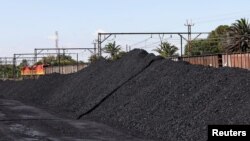After a six-year hiatus, South Africa in 2021 held a bidding round for companies to operate wind and solar projects, attracting aggressive offers from more than 100 renewables companies, eager to make up for the shortfalls of state power generator Eskom.
he winners include EDF, Scatec , Engie, and Mainstream Renewable Power. They are among nine companies pledging to supply nearly 4,600 megawatts (MW) of power in the next two years that would go some way to solving Eskom's problems.
Eskom said last week that maintenance and breakdowns had knocked nearly 45% of its total 46,000 MW capacity offline. It says it needs up to 6,000 MW of additional generating capacity.
Apart from the unreliability of Eskom's ageing coal power plants, South Africa is also under pressure to end its reliance on highly-polluting coal as it is the world's 12th biggest emitter of climate-warming gases.
At U.N. climate talks last year, Britain, France, Germany, the European Union and the United States pledged $8.5 billion to help South Africa make a swifter transition from coal.
The problem for the companies that saw opportunity in South Africa's energy needs is they agreed to supply power at tariffs so low they stand a minimal chance of making a profit under current conditions.
Tariffs for last year's "power-on-demand" round specifically to provide electricity to meet Eskom's supply shortfalls were 34% lower than the previous round in 2015.
After four regular rounds, as well as power-on-demand tenders, the process went dormant in 2015 after the government of former President Jacob Zuma halted renewables procurement.
Since then, the invasion of Ukraine by Russia, the world's biggest exporter of gas and second largest crude oil supplier has driven energy costs and inflation to multi-year highs.
In addition, supply chain disruptions linked to the pandemic have also increased costs, such as shipping, and a weakening local rand currency has made imports of turbines and solar modules more expensive.
The South African Photo Voltaic Industry Association says capital expenditure and component inflation have risen by up to 40% for solar projects since companies locked in tariffs last August.
A banker working on several of the energy projects said it was a perfect storm. He asked not to be named as he is not authorized to speak to the press.
He and a renewables company executive said the shift in global economic conditions meant the bulk of those projects will struggle to reach financial close, a fund-raising process after which construction can begin.
Tshifhiwa Bernard Magoro, head of the Independent Power Producers (IPP) Office, the government body overseeing the projects, told Reuters he was engaging with companies.
"I have to emphasize we need the power," he said. "We are doing all we can within the ambit of the law to help them reach financial closure."
The company executive pointed to two options: an adjustment of tariffs - something he deemed unlikely - or flexibility on financial close deadlines in the hope that costs will fall.
"Otherwise, it's untenable," he said, adding that he expected global economic and supply chain issues to ease in the short-term.







